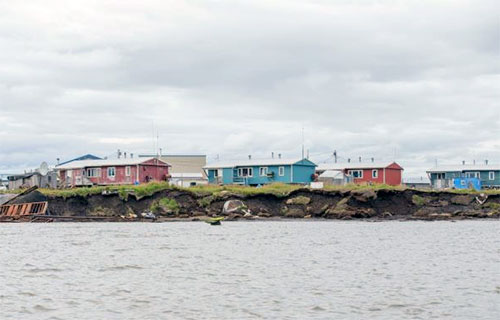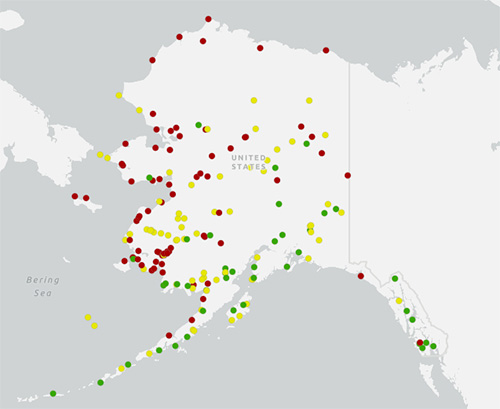Storm-driven erosion on the Ninglik River that was creeping towards Newtok has caused the southwest Alaska community to relocate nine miles downriver to Mertarvik. |
The project aims to accomplish three objectives:
• Conduct a landscape assessment of Tribal climate change adaptation activities in Alaska and establish a baseline understanding of Tribal climate change challenges and responses.
• Formulate and launch an Alaska Tribal Climate Change Advisory Group to ensure that Tribal climate change efforts across the State are led and prioritized by Alaska Native people.
• Lead the Tribal review and publication of the Unmet Needs of Environmentally Threatened Alaska Native Villages Report, which will inform NOAA and other agency investment priorities.
"The Department of Commerce takes seriously its responsibility to engage with Tribal partners, and this innovative pilot project is an example of this commitment," said Deputy Secretary of Commerce Don Graves. "Bringing together NOAA's climate data and tools with the equity, health and service delivery expertise of ANTHC will help ensure Alaska Native communities have the resources to make informed decisions in the face of climate risks."
The project was developed in response to feedback received during a 2021 climate and equity roundtable. Participants focused on climate equity (the concept of ensuring that communities that bear unequal burdens created by climate change have the resources needed to build resilience and adapt to change), community health and well-being and barriers Alaska Native communities face in accessing needed resources. Addressing environmental threats that are worsening with climate change, including food security, extreme flooding and erosion and melting permafrost were identified as high priorities.
In 2019, the Denali Commission Statewide Threat Assessment found that 144 Alaska Native communities (43 percent of all communities in the state of Alaska) are likely to face some degree of infrastructure damage from erosion, flooding, and/or permafrost thaw. Communities are grouped into three categories groups 1-3, with group 1 (red) most at-risk, group 2 (yellow) at moderate risk, and group 3 (green) at lower risk . |
ANTHC is the largest and most comprehensive Tribal Health Organization in the country and is uniquely situated to provide insights on effective approaches to equitably deliver services to Tribal communities that are environmentally threatened by climate change. The $279,088 project includes a $258,000 NOAA investment in Fiscal Year 2022, with ANTHC providing the balance through in-kind services.
“We recognize that our strength and resilience comes from our ability to work together to solve problems. Erosion, flooding, and melting permafrost continue to threaten Alaska Native communities, impacting the culture, and the ability to hunt and gather food to nourish our loved ones,” said Valerie Nurr’araaluk Davidson, President and CEO of ANTHC. “Through partnerships with NOAA and their continued efforts, we are able to address the environmental issues that worsen with climate change.”
Bringing together the capabilities of ANTHC with NOAA’s climate science and services expertise will provide a clear focus on climate change issues. Understanding specific actions that are responsive to Alaska Native communities and supporting their efforts to prepare and respond to how their environment is changing are keys to a successful partnership.
“NOAA hears loud and clear that Alaska Native perspectives, voices and leadership must drive climate change conversations and action for Tribal communities across Alaska. This project is about establishing a partnership based on trust, mutual respect, deep listening and meaningful follow-through in order to realize positive changes in achieving climate equity,” said NOAA Administrator Rick Spinrad, Ph.D. “NOAA is proud to work directly with ANTHC on this project to build trusted relationships and meaningful partnerships with Tribes and other Tribal Organizations in order to address barriers and improve Tribal community resilience to climate change across Alaska.”
This pilot builds on NOAA’s commitment to sustained engagement with underserved communities, and is part of an investment in seven pilot projects in the coming years. Each regional pilot will respond directly to feedback received from partners during climate and equity roundtable discussions that were conducted in 2021. Pilots will take a unique, place-based approach to helping communities that have been traditionally underserved by federal resources better understand, prepare for and respond to climate change.
Related:
More about upcoming pilot project announcements, NOAA’s ongoing environmental justiceefforts, and NOAA resources for Tribes — including information on the Bipartisan Infrastructure Law.
Edited By: Mary Kauffman, SitNews
Source of News:
NOAA
www.noaa.gov
Representations of fact and opinions in comments posted are solely those of the individual posters and do not represent the opinions of Sitnews.
Send a letter to the editor@sitnews.us
SitNews ©2022
Stories In The News
Ketchikan, Alaska
Articles & photographs that appear in SitNews are considered protected by copyright and may not be reprinted without written permission from and payment of any required fees to the proper freelance writers and subscription services.
E-mail your news & photos to editor@sitnews.us
Photographers choosing to submit photographs for publication to SitNews are in doing so granting their permission for publication and for archiving. SitNews does not sell photographs. All requests for purchasing a photograph will be emailed to the photographer.


